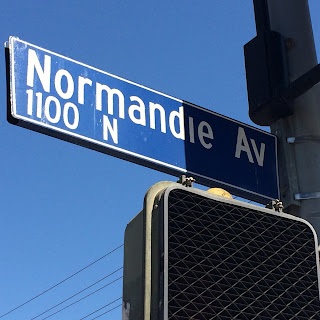Back in the day, Hollywood and West Hollywood were mostly farmland and well outside of Los Angeles proper.
Today, nothing remains of the farm north of Gower Street where
Joseph Mascarel grew tomatoes and other vegetables.
René Blondeau's tavern, rented to early filmmakers who used it as Hollywood's first film studio, was torn down long ago to make room for Gower Gulch Plaza (what IS it with Gower Street and erased history?).
But there are still remnants of the area's connections to France (and French-speaking Belgium).
Early Hollywood booster Daeida Wilcox was so keen to bring culture to the new town that she approached French artist Paul de Longpré, offering three lots of her own property for a home, studio, art gallery, and expansive flower gardens. The de Longpré estate was such a popular tourist attraction that the Pacific Electric Railway's fabled Balloon Route had to add a trolley spur on nearby Ivar Avenue to handle the crowds.
The Mission Revival house (designed by Québecois architect Louis Bourgeois - do not confuse with French artist Louise Bourgeois) is long gone. Commercial buildings and a parking facility now stand on the site (Cahuenga Boulevard north of Hollywood Boulevard).
But, six blocks southwest...
...De Longpré Park is open from dawn to dusk...
...on De Longpré Avenue.
In a more touristy part of Hollywood, the Walk of Fame pays tribute to some of the entertainment industry's biggest French (and French-American) names.
 |
| Leslie Caron |
 |
| Louis Jourdan |
 |
| Pierre Cossette |
 |
| Maurice Tournier |
 |
| Sarah Bernhardt |
 |
| Pierre Monteux |
 |
| Walt Disney (What? He totally counts) |
 |
| Sharon Gless. As in, THAT Gless family. |
 |
| Roy Disney |
 |
| Adolphe Menjou |
 |
| Claudette Colbert |
 |
| Franchot Tone |
 |
| Laura La Plante |
 |
| Robert Goulet |
 |
| Dorothy Lamour |
 |
| Filmmaking pioneer Auguste Lumiere. (Why is his name spelled incorrectly?) |
 |
| Nanette Fabray |
 |
| Maurice Chevalier |
 |
| Renée Adorée |
 |
| The other filmmaking brother, Louis Lumiere. |
 |
| Rudy Vallee |
Not pictured (due to construction chaos, vendor carts, or sluggish tourists): Joan Blondell, Henri Rene, Jean Renoir (son of painter Pierre-Auguste Renoir, dubbed "the greatest of all directors" by Orson Welles), and Rod La Rocque.
Musso & Frank Grill, the oldest restaurant in Hollywood, has French roots. Founded in 1919 by Frank Toulet, the restaurant was called Francois, or Frank's Café, until Toulet took on Joseph Musso as a business partner. The menu, created long ago by their (French) chef Jean Rue, has changed very little in the past 98 years.
Hat tip to my mom's family...
Normandie Avenue, one of the longest streets in Los Angeles County at 22.5 miles, stretches from Hollywood to Harbor City. It's not a coincidence that Normandie Avenue, named for a coastal, seafaring province, got its name while Joseph Mascarel - a career sailor - served as Mayor of Los Angeles.
Close to where Hollywood and Los Feliz meet Griffith Park, there is a Ponet Drive. (Don't try to drive in this neighborhood...just don't. No parking, no stopping, super skinny roads clearly meant only for residents. Just trust me when I say it's there.)
Speaking of
Victor Ponet...
Victor Ponet - cabinetmaker, city undertaker, Belgian vice consul, President of the Evergreen Cemetery Association, vendor of whatever else he could sell from his coffin showroom - retired to a farm that made up much of modern-day West Hollywood. In those days, however, it was definitely still the country.
Victor donated the land and original building for
St. Victor Catholic Church, which remains active to this day.
Victor's descendants, the Montgomery family, developed
Sunset Plaza on land inherited from Victor.

































No comments:
Post a Comment